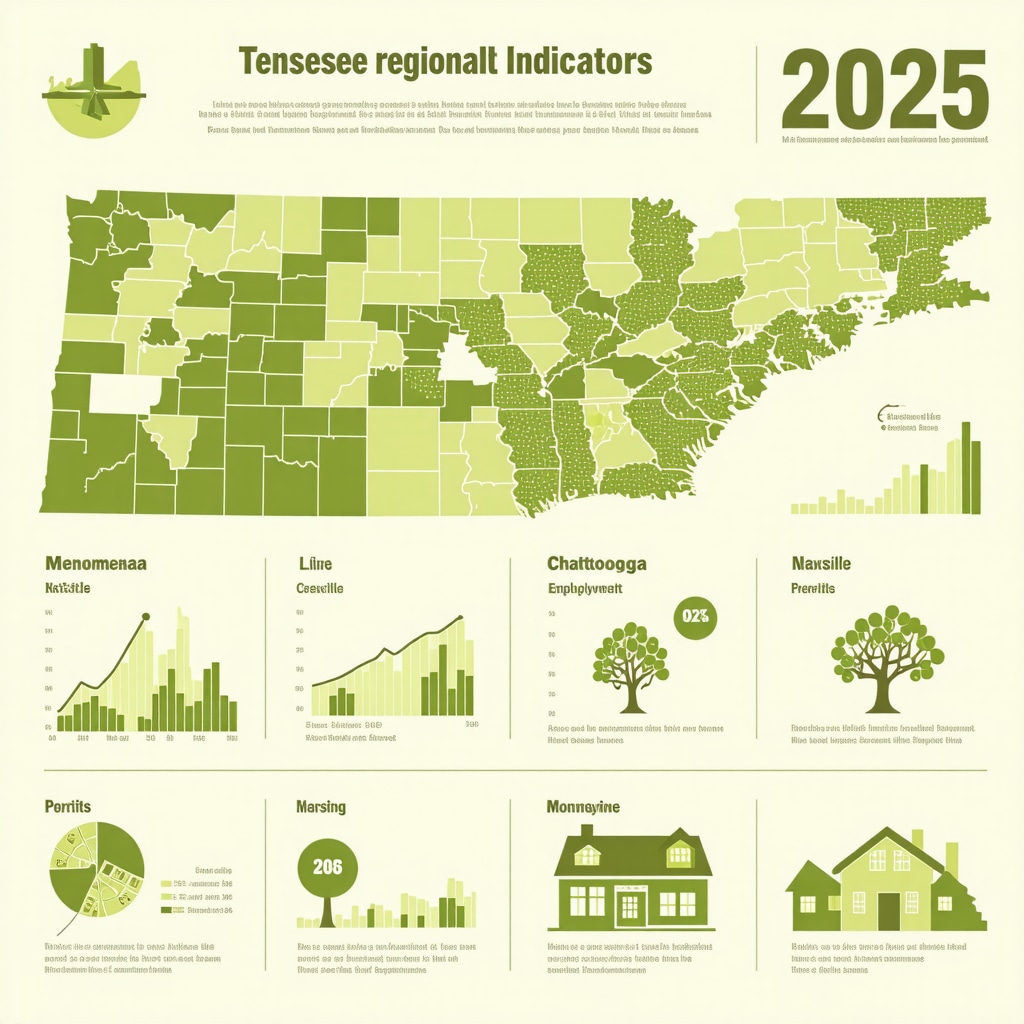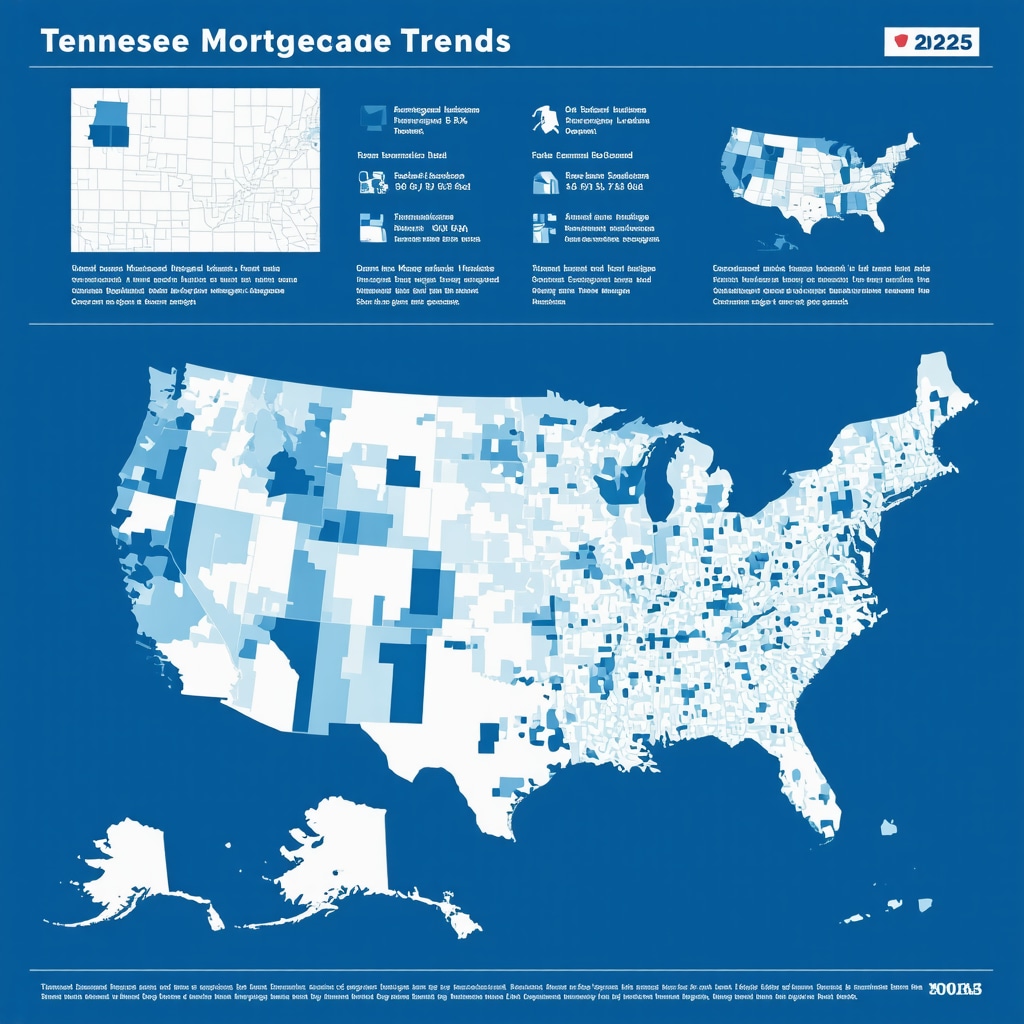Decoding Tennessee’s Mortgage Rate Dynamics: What Homebuyers Must Know Today
In the ever-shifting terrain of mortgage lending, Tennessee presents a particularly intriguing case study in 2025. With rates influenced by nationwide economic shifts alongside unique state-level factors, understanding Mortgage Rate Trends Today: Tennessee’s Current Lending Landscape is essential for prospective homeowners and investors alike. The interplay between federal monetary policy, local housing demand, and credit environments creates a multifaceted story worth exploring with expert eyes.
How Tennessee’s Economic Pulse Shapes Lending Rates
Tennessee’s robust economic sectors—from manufacturing hubs in Chattanooga to burgeoning tech corridors in Nashville—directly impact mortgage rate fluctuations. When local economies thrive, mortgage lenders adjust rates reflecting risk appetite and competition. For instance, recent data suggests that Tennessee’s unemployment rates stabilizing below the national average have encouraged lenders to offer more competitive fixed and adjustable mortgage products. This economic vitality often translates into a nuanced lending landscape where rates may slightly differ across metro areas, signaling homebuyers to tailor their strategies regionally.
Creative Financing Options: Beyond the Conventional Fixed Rate
While fixed-rate mortgages remain a staple, Tennessee borrowers increasingly explore adjustable-rate mortgages (ARMs), FHA loans, and VA loans to capitalize on lower initial rates or specific eligibility advantages. These alternatives can be especially beneficial amid rising rates, providing flexibility and potential savings for qualified buyers. For example, veterans in Tennessee benefit from VA loans, which often feature no down payment and competitive rates—an advantage worth understanding in today’s market. For more insight into these options, readers can explore our detailed guide on VA home loans in Tennessee.
What Factors Are Influencing Tennessee Mortgage Rates More Than Ever in 2025?
The mortgage rate landscape in Tennessee today is shaped by several key factors. First, the Federal Reserve’s monetary policy adjusts benchmark interest rates, indirectly affecting mortgage yields. Secondly, the state’s real estate demand dynamics—driven by population growth in cities like Nashville and Knoxville—create upward pressure on rates due to increased loan volume and competition among borrowers. Additionally, credit score trends within Tennessee’s population play a pivotal role; lenders reward higher credit scores with better rates, making financial preparation crucial. For those looking to understand how credit scores shape mortgage interest rates specifically in Tennessee, our expert resource explores this impact in depth.
Expert Tips to Navigate Tennessee’s Lending Market Successfully
In a market as fluid as Tennessee’s, timing and lender choice become strategic tools. Locking rates at the optimal moment can save thousands over a loan’s lifetime, and working with knowledgeable mortgage brokers familiar with Tennessee’s nuances is invaluable. Experts recommend monitoring local economic indicators and mortgage rate forecasts such as our 2025 mortgage rate forecast for Tennessee to anticipate favorable windows for locking in rates.
Moreover, diversifying loan type considerations and understanding the trade-offs between fixed and adjustable rates—as discussed in this expert guide—can empower borrowers to tailor their mortgage to their financial situation and market conditions.
Curious about how these trends might affect your home financing plans? Join the conversation and share your questions or experiences below to connect with Tennessee mortgage experts and fellow homebuyers.
For authoritative insights into the broader economic context influencing mortgage rates, the Federal Reserve’s official statements and economic reports offer essential perspectives. Visit the Federal Reserve Monetary Policy page for the latest updates.
Understanding Regional Variations in Tennessee Mortgage Rates
While statewide trends provide a broad overview, mortgage rates in Tennessee often exhibit significant regional variation. Metropolitan hubs such as Nashville and Memphis tend to offer more competitive rates due to higher lending competition and larger loan volumes. Conversely, rural areas may face slightly elevated rates reflecting localized economic conditions and lender risk profiles. This differentiation means that savvy buyers should consider regional market data when deciding where and how to finance their home purchase. For a deep dive into specific city-level trends, check out Unlocking Memphis Mortgage Rates for 2025 and Knoxville Home Loan Rates Latest Trends for Spring 2025.
Refinancing Strategies: When and How to Act in Tennessee
Refinancing remains a vital tool for Tennessee homeowners aiming to capitalize on favorable rate shifts or adjust loan terms. However, the timing of a refinance can drastically affect savings. Experts advise monitoring market indicators closely, particularly when rates drop by at least 0.5% from your current mortgage rate. Utilizing resources like Refinance Rates in Tennessee: When to Lock for Maximum Savings can help borrowers make informed decisions. Additionally, understanding credit score impacts on refinancing options, as detailed in Refinance Rates Tennessee: How Credit Scores Affect Your Deal, is crucial for maximizing benefits.
How Can Tennessee Homebuyers Leverage Mortgage Brokers for Optimal Rates?
Mortgage brokers in Tennessee serve as strategic allies for homebuyers navigating complex lending landscapes. By accessing a diverse pool of lenders, brokers can negotiate competitive rates and tailor loan products to individual financial profiles. However, selecting the right broker requires due diligence. Key considerations include licensing, fee transparency, and local market expertise. Resources such as Mortgage Brokers vs Direct Lenders in Tennessee and Choosing the Right Mortgage Broker in Tennessee provide comprehensive guidance. Engaging a knowledgeable broker can significantly improve loan terms and ease the application process, especially for first-time buyers or those with unique financial situations.
Incorporating Economic Forecasts Into Your Mortgage Strategy
Staying informed about macroeconomic forecasts and local housing market projections is essential to optimize mortgage decisions in Tennessee. Economic indicators such as inflation rates, employment data, and federal policy shifts directly influence lending conditions. According to the Federal Reserve Monetary Policy page, recent measures aimed at controlling inflation have led to cautious rate adjustments, which lenders pass on to borrowers. By monitoring these developments, homebuyers and investors can time their mortgage locks to secure favorable terms.
Have you used a mortgage broker in Tennessee or refined your refinancing strategy recently? Share your experiences and questions below to enrich our community’s expertise and help fellow homebuyers navigate today’s lending landscape.
Leveraging Local Economic Indicators for Precision Mortgage Timing in Tennessee
Mortgage rates in Tennessee are not only a reflection of national economic policies but also deeply intertwined with hyperlocal economic indicators. Variables such as regional employment growth rates, new housing permit issuances, and even infrastructure projects significantly influence lender risk assessments and ultimately, the mortgage rates offered. For example, a surge in industrial development around Chattanooga has historically correlated with tightened lending margins due to increased borrower demand and perceived economic stability. Astute buyers and investors can monitor these localized data points through resources like the Tennessee Department of Economic and Community Development’s Economic Data Portal to anticipate rate fluctuations and strategically time their loan applications.
Innovative Mortgage Products Tailored to Tennessee’s Diverse Borrower Profiles
Beyond conventional fixed and adjustable-rate mortgages, Tennessee’s lending market is witnessing a rise in hybrid mortgage products designed to mitigate risk and maximize borrower flexibility. One such innovation is the “Step-Rate Mortgage,” which offers an initially low fixed rate that incrementally increases over a predetermined period before stabilizing. This product caters to buyers expecting income growth, such as young professionals in Nashville’s tech sector. Additionally, “Community Investment Loans” have emerged, backed by local government incentives aiming to spur affordable housing development in underserved rural counties. These specialized loans often come with rate discounts and down payment assistance, enabling broader access to homeownership across Tennessee’s socioeconomic spectrum.
How Do Tennessee’s Unique Demographics Influence Mortgage Underwriting and Rates?
Mortgage underwriting in Tennessee increasingly incorporates demographic analytics to fine-tune risk assessment models. The state’s growing urban populations, combined with significant rural communities, create heterogeneous credit profiles. Lenders are now leveraging advanced data science techniques to analyze variables such as income volatility, employment sector stability, and regional migration patterns. This granular approach allows for differentiated mortgage rate offerings that reflect actual borrower risk more accurately than traditional models. For instance, Nashville’s influx of tech workers with stable salaries may secure lower rates compared to applicants in agricultural sectors experiencing seasonal income fluctuations. Understanding these demographic nuances is crucial for borrowers aiming to optimize their mortgage terms.
Integrating Federal Reserve Policies with Tennessee’s Housing Market Realities
While Federal Reserve policy sets the broad framework for interest rates, Tennessee’s housing market exhibits unique sensitivities that can amplify or dampen these effects. Recent Fed adjustments aimed at inflation control have coincided with Tennessee’s housing inventory shortages, creating a paradox where rates move higher even as demand remains robust. This dynamic challenges traditional assumptions and necessitates a sophisticated analysis that blends macroeconomic signals with micro-market realities. For a comprehensive understanding of how federal monetary policy intersects with regional markets, consult the Federal Reserve Monetary Policy page, which provides detailed statements and economic projections relevant to Tennessee’s evolving mortgage landscape.
Ready to delve deeper into Tennessee’s mortgage intricacies or need personalized advice tailored to your financial profile? Engage with our expert consultants today and transform uncertainty into informed action.

Harnessing Predictive Analytics for Smarter Mortgage Decisions in Tennessee
As Tennessee’s mortgage market evolves, leveraging predictive analytics and big data has become indispensable for borrowers seeking competitive rates. Financial institutions now deploy sophisticated algorithms analyzing vast datasets—ranging from borrower credit behavior to macroeconomic signals and regional housing trends—to forecast optimal loan terms. This technological integration enables lenders to tailor mortgage offers dynamically, enhancing precision in risk-based pricing. For Tennessee homebuyers, engaging with lenders who utilize predictive analytics can yield advantageous mortgage products aligned with their unique financial profiles and market timing.
Regional Economic Disruptors: Unpacking Their Hidden Effects on Mortgage Rate Volatility
Beyond broad economic indicators, localized disruptions—such as supply chain bottlenecks in manufacturing or shifts in tourism patterns impacting hospitality sectors—introduce volatility in Tennessee’s mortgage rates. For example, unexpected fluctuations in the automotive industry around Smyrna can ripple through credit availability and lending costs. Recognizing these nuanced economic variables empowers borrowers and investors to anticipate transient rate adjustments and adjust financing strategies accordingly. Continuous monitoring of sector-specific news, alongside traditional economic data, is thus critical for sophisticated mortgage planning.
How Can Advanced Mortgage Rate Hedging Instruments Benefit Tennessee Borrowers?
In the face of rising rate uncertainty, Tennessee’s financially savvy borrowers increasingly explore mortgage rate hedging instruments, such as interest rate locks with float-down options and mortgage rate swaps. These financial tools provide mechanisms to mitigate the risk of unfavorable rate movements during the loan approval period or over the mortgage’s lifespan. While traditionally employed by institutional investors, such strategies are becoming accessible to individual homebuyers through specialized lenders and brokers. Understanding the eligibility criteria, cost-benefit parameters, and market timing of these instruments can significantly enhance mortgage affordability and risk management.
Integrating Expert Insights: A Closer Look at Federal Reserve Influence on State Mortgage Practices
The Federal Reserve’s nuanced monetary policy shifts resonate distinctly within Tennessee’s heterogeneous housing markets. According to the Federal Reserve Bank of St. Louis analysis, regional economic conditions modulate how federal rate changes translate into mortgage lending costs, often creating asymmetrical effects across metropolitan and rural areas. This underscores the importance for Tennessee borrowers to contextualize federal policy within their local market dynamics when strategizing mortgage timing and selection.
To capitalize on these advanced insights and optimize your mortgage approach in Tennessee’s dynamic 2025 lending environment, connect with our expert advisory team today. Elevate your home financing with precision, foresight, and tailored strategies.

Frequently Asked Questions (FAQ)
1. What are the main factors currently influencing mortgage rates in Tennessee?
Mortgage rates in Tennessee are primarily influenced by the Federal Reserve’s monetary policy, local economic conditions such as employment rates and housing demand, credit score distributions among borrowers, and regional market dynamics including urban versus rural lending differences. These combined factors create a complex rate environment requiring careful analysis for optimal borrowing.
2. How do Tennessee’s regional economic conditions affect mortgage rates?
Different regions in Tennessee exhibit varying mortgage rates due to disparities in economic growth, employment sectors, and housing market activity. For instance, metropolitan areas like Nashville and Memphis often have more competitive rates driven by higher lending competition and larger loan volumes, while rural areas may face slightly higher rates reflecting localized risk assessments.
3. What alternative mortgage products are gaining popularity in Tennessee besides fixed-rate loans?
Borrowers in Tennessee increasingly consider adjustable-rate mortgages (ARMs), FHA loans, VA loans, and innovative products like step-rate mortgages and community investment loans. These options offer flexibility, lower initial rates, or government-backed benefits that can be advantageous in a fluctuating rate environment and for diverse borrower profiles.
4. When is the best time for Tennessee homeowners to refinance their mortgages?
Experts recommend refinancing when mortgage rates drop by at least 0.5% below your current rate. Monitoring market trends, credit score improvements, and cost-benefit analyses through specialized resources can help homeowners determine optimal timing to maximize savings and improve loan terms.
5. How can Tennessee homebuyers leverage mortgage brokers to secure better rates?
Mortgage brokers in Tennessee can access a broad network of lenders, negotiate competitive rates, and tailor loan products to individual financial circumstances. Choosing a broker with local expertise, transparent fees, and proper licensing is crucial to optimizing mortgage outcomes and simplifying the application process.
6. What role do predictive analytics play in Tennessee’s mortgage market?
Predictive analytics enable lenders to analyze vast datasets—including borrower credit behavior and economic signals—to forecast optimal loan pricing and risk. For borrowers, engaging with lenders utilizing these technologies can result in more precise, competitive mortgage offers aligned with their profiles and market timing.
7. How do local economic disruptions impact mortgage rate volatility in Tennessee?
Localized economic shocks—such as supply chain delays in manufacturing or shifts in tourism—can cause temporary mortgage rate fluctuations by affecting lender risk assessments and credit availability. Staying informed on sector-specific developments helps borrowers anticipate and adapt to these rate shifts.
8. What mortgage rate hedging options are available to Tennessee borrowers?
Financial tools like interest rate locks with float-down options and mortgage rate swaps offer mechanisms for borrowers to protect against unfavorable rate increases during the loan approval or amortization period. While traditionally for institutional use, some lenders now provide these instruments to individual homebuyers under specific conditions.
9. How do Tennessee’s demographic trends influence mortgage underwriting?
Lenders incorporate demographic data such as income stability, employment sectors, and migration patterns to refine risk models. This results in differentiated rate offerings reflecting the diverse economic realities across urban and rural Tennessee, allowing borrowers to better understand how their profiles affect mortgage terms.
10. How does federal monetary policy interplay with Tennessee’s housing market?
Federal Reserve rate adjustments set broad interest rate trends, but Tennessee’s unique housing supply constraints and economic growth can amplify or moderate these effects. Understanding this interplay helps borrowers navigate paradoxical situations where rates rise amid strong demand, guiding more informed mortgage decisions.
Trusted External Sources
- Federal Reserve Monetary Policy Page (federalreserve.gov): Provides authoritative updates on national interest rate decisions and economic outlooks that directly influence mortgage rates nationwide and in Tennessee.
- Tennessee Department of Economic and Community Development – Economic Data Portal (tn.gov/ecd): Offers localized economic statistics and reports crucial for understanding regional market conditions impacting lending risk and mortgage pricing.
- Federal Reserve Bank of St. Louis – Regional Economic Analysis (stlouisfed.org): Delivers expert insights on how federal monetary policy differentially affects regional mortgage markets, including Tennessee, refining borrower strategies.
- National Association of Realtors (NAR) (nar.realtor): Provides comprehensive housing market data and trends essential for contextualizing Tennessee’s real estate environment within national dynamics.
- Consumer Financial Protection Bureau (CFPB) (consumerfinance.gov): Offers guidance on mortgage products, borrower rights, and refinancing options relevant to Tennessee consumers seeking informed mortgage decisions.
Conclusion
Understanding mortgage rate trends in Tennessee today requires an expert grasp of the complex interactions between federal monetary policies, localized economic factors, demographic shifts, and innovative lending products. Tennessee’s diverse markets—from vibrant urban centers to rural communities—demand tailored strategies incorporating predictive analytics, regional economic indicators, and smart use of financing alternatives. Homebuyers and investors who leverage these insights, alongside trusted mortgage brokers and timely refinancing tactics, position themselves to secure the most favorable mortgage terms in 2025’s dynamic landscape. We encourage readers to apply this knowledge, engage with our expert community, and explore related resources to empower confident, well-informed home financing decisions in Tennessee’s evolving lending environment.
Share your experiences, ask questions, or explore our in-depth guides to stay ahead in Tennessee’s mortgage market today.

